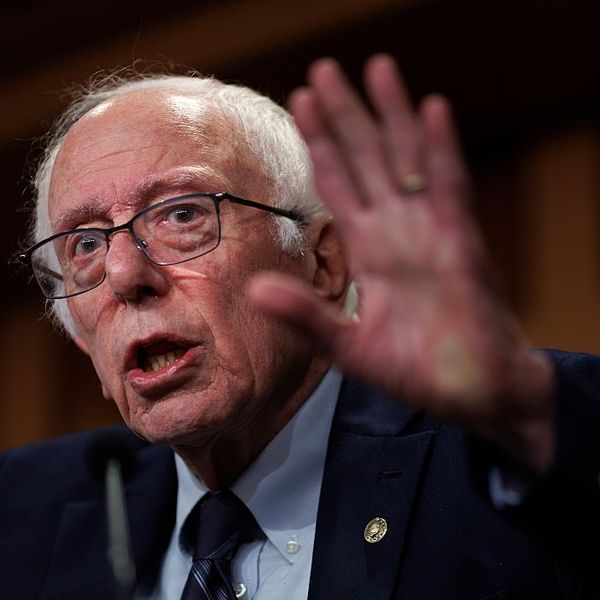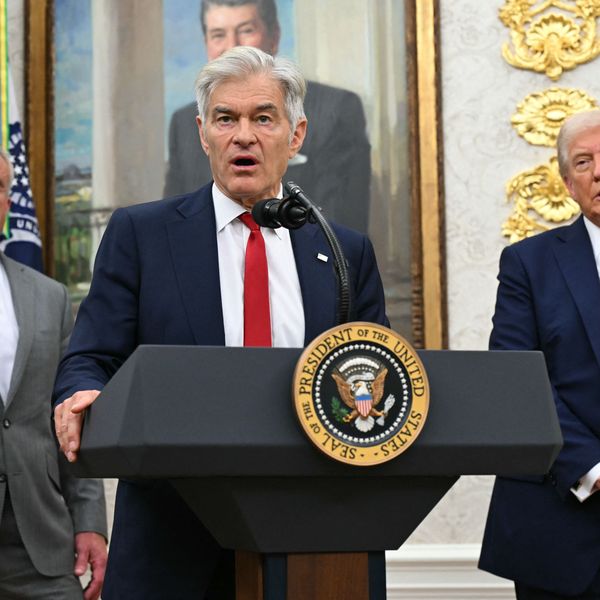Sen. Bernie Sanders on Monday reiterated his concerns over the staggering price tag of a newly approved Alzheimer's medication after the Biden administration failed to respond to his letter last month urging swift executive action to force down the cost.
In a new letter to Health and Human Services Secretary Xavier Becerra, Sanders (I-Vt.) wrote that the current $26,500 list price for Leqembi is "outrageous" and demanded that the Biden administration explain "why the cost of this drug cannot be reduced to $8,900—which is the price independent experts believe it should cost based on its effectiveness."
Sanders, the chair of the Senate Health, Education, Labor, and Pensions (HELP) Committee, raised particular alarm over the drug's possible impact on Medicare's finances.
Shortly after the Food and Drug Administration (FDA) approved Leqembi last week, the Centers for Medicare and Medicaid Services announced that Medicare will cover the treatment "broadly"—a contrast from its decision last year to limit coverage of Aduhelm, a different high-priced Alzheimer's drug.
KFF estimates that if 5% of people with Alzheimer's disease use Leqembi—also known as lecanemab—Medicare's annual outlays for the IV infusion treatment would be $8.9 billion, a spending increase that could push premiums up for all Medicare recipients.
As Sanders wrote, "Not only does the high price of Leqembi threaten Medicare's finances, it will also negatively impact seniors on fixed incomes suffering from Alzheimer’s who simply cannot afford to pay the 20% co-payment of more than $5,000 a year for this drug."
"With a median income of about $30,000 a year for seniors on Medicare the purchase of this one drug would amount to over one-
sixth of their limited income. For one drug! That is unacceptable," the senator continued. "A prescription drug is not effective if a patient who needs that drug cannot afford it."
"If I do not receive an adequate and timely response, I will be inviting you to attend a HELP Committee hearing so that you can explain to the American people why we pay, by far, the highest prices in the world for prescription drugs."
Sanders first wrote to the Biden administration about Leqembi's cost on June 7, when he warned that the price tag proposed by manufacturers Biogen and Eisai was "unconscionable" and "grossly unfair to seniors suffering from Alzheimer's disease."
But Becerra never responded to Sanders' June letter, the senator wrote Monday.
Sanders requested in his new letter that Becerra provide answers to the fresh series of questions by July 21.
Among the questions Sanders wants answered is whether Becerra is "prepared to use [his] existing authority, under 28 U.S.C. Section 1498, to break the patent monopoly on exorbitantly priced prescription drugs."
"If I do not receive an adequate and timely response," Sanders wrote, "I will be inviting you to attend a HELP Committee hearing so that you can explain to the American people why we pay, by far, the highest prices in the world for prescription drugs and how those outrageous prices threaten Medicare beneficiaries and patients throughout the country."
On top of concerns about its potential harms to Medicare's financial health, experts and consumer advocates have said they're worried about the Leqembi's effectiveness and safety for Alzheimer’s patients, citing the drug's impacts on some trial subjects.
Dr. Robert Steinbrook, director of Public Citizen's Health Research Group, said in a statement last week that "the FDA's decision to grant full approval for lecanemab to treat adult patients with Alzheimer’s disease is misguided and very disappointing."
"The evidence for the drug's clinical benefits does not outweigh its substantial health risks," Steinbrook argued. "The fact that a black box warning for brain swelling and bleeding risks has been added to the prescribing information for lecanemab underscores the substantial safety concerns."
"Patients with Alzheimer's disease and their families are understandably desperate for better treatments," he added. "When it approves drugs for Alzheimer's disease with little or no benefit and significant health risks, the FDA fails patients and the public."



